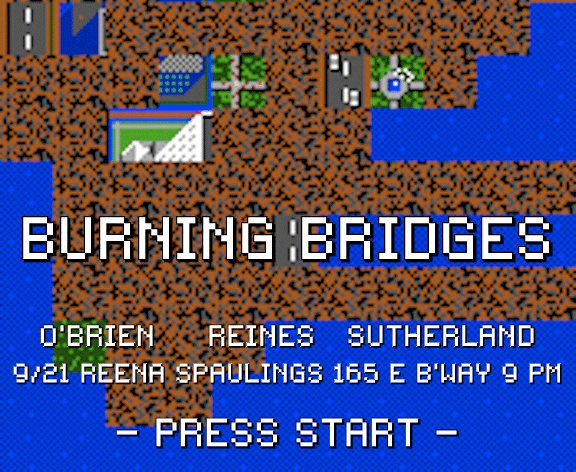“Here, the obsolete game-as-medium lights its fires with the levity of camp. Its “new aesthetic” texture makes a tragicomic figure for contemporary poetry: an anachronistic genre of gaming while Rome burns—or dreaming Rome might burn, while in fact the empire goes on using stuff up outside as usual, pleasant or painful, awful but cheerful, the deflector shield quite operational when your friends arrive.” — David Gorin at the Boston Review considers the perverse negativity of those crud-ducks over at Claudius App, whose reading this Saturday 9/21 @ 9PM @ Reena Spaulings with Geoffrey G. O’Brien, Ariana Reines, and Keston Sutherland
you should definitely avoid, because just look at this animated GIF below they made for it that links directly to the Facebook event, which supposedly 118 people are going to, and look, I’ve been to Brooklyn, 118 people don’t even live in that pie shop, so, yeah, sure, keep murdering your brother, Claudius, it’s not like we don’t all know he’s the real king, and it’s not like we’re not going to keep putting slippers on your hands so you rub your eyes with your slippers when you wake up:
CGS’s “Drone Poetics,” or, my desire to be unobtrusive
Up at the Boston Review blog, Carmen Gimenez Smith gives real talk about being a poet-academic and the inherent privilege of it:
I often struggle with how I might best use the privilege I possess as a middle-class poet. I’m afforded the platforms of professor and writer, platforms I don’t really utilize to effect change in the world. This might be due to a cultural indoctrination suggesting that poetry is a marginal practice, yet poets such as Adrienne Rich, Denise Levertov, Gary Snyder, Brenda Hillman, and, more recently, Mark Nowak, Shane McCrae, Jena Osman, and Craig Santos Perez have utilized their privilege and platform to uncover, expose, and counter accepted narratives about living in a declining empire in which our agency as citizens is shrinking. While the government watches us, more and more poets and writers are watching back, documenting the injustices that stain our present moment. We need more of that. I should be doing that.
I’m currently editing this massive anthology with Joshua Marie Wilkinson called The Force of What’s Possible: Writers on the Avant-Garde and Accessibility (heading to an Internet purchasing place near you in 2015 from Nightboat Books). In it, we have roughly 100 original essays discussing the role of accessibility in writing as well as Badiou’s questioning of Empire and recognition. Putting together these essays, especially in light of Carmen’s BR post, I keep returning to a word: responsibility. What responsibility do we have as writers? Do we have a responsibility? To whom? Should we even care about accountability? And accountable to whom? We have this great power: the ability to tell stories. What do we do with it? Do we just recycle the same and call it new?
“We need critics who set impatient standards, ask uncomfortable questions, and maintain an omnivorous appetite for the unfamiliar, the awkward, the angry, the untoward. Instead, we have a gated community, a velvet-roped garden party, a Brooklyn vs. Cambridge fantasy baseball league. We don’t need critics obsessed with the real, or with whether the novel is alive or dead. We need critics willing to look at the novels that are already out there, going about their business, quietly making the future of literature, whether “we” like it or not.” — from Jess Row’s provocative and expansive “The Novel is Not Dead” in the Boston Review, which has so far scored a Benjamin Kunkel self-defense in the comments; so, you know, bombs away.
“boston review” or “shitty suck-sack”? you be the judge
 in an attempt to be really mean, i decided to randomly attack a journal. so i went to google and typed in “the most literary journal” hoping someone would have referred to themselves like that. then i tried “mega awesome lit journal” and i got nothing. then i typed in a stupid sounding name “the boston review” and ta-da, it exists. here, for your spiteful edification, is me interjecting things into their about page:
in an attempt to be really mean, i decided to randomly attack a journal. so i went to google and typed in “the most literary journal” hoping someone would have referred to themselves like that. then i tried “mega awesome lit journal” and i got nothing. then i typed in a stupid sounding name “the boston review” and ta-da, it exists. here, for your spiteful edification, is me interjecting things into their about page:
“Boston Review is a nonpartisan magazine of ideas [yeah, shitty ideas]: animated by hope [and stupid-assedness] , committed to equality and reason [and being lame and butthole-y], convinced that the imagination eludes political categories [p.s.: we blow more than the show “m.a.s.h”]. We see each issue as a public space where people can loosen the hold of conventional preconceptions [really? or perhaps, loosen a stool into your mouth, just perhaps?] and bring this openness to bear on today’s most pressing issues [like what a good plot arc is]. Our mission requires that as editors we shun polemic and partisanship [and being not-dumb], uphold the highest standards of argument and evidence, value ambition and originality, seek widely diverse perspectives, and make complex ideas accessible [also to publish things as close compositionally to shit as possible without streaking the printer]. We have a national readership of men and women [and people who wear slippers in the reading room when they read our publication] who are engaged in the challenge of today’s world; who want deeper [anal] coverage of current affairs than the mainstream media offers; and who see the arts as an essential part of the human enterprise [yeah, the human enterprise of being a fuckhead with a shriveled penis that wears brooks brothers khakis].

